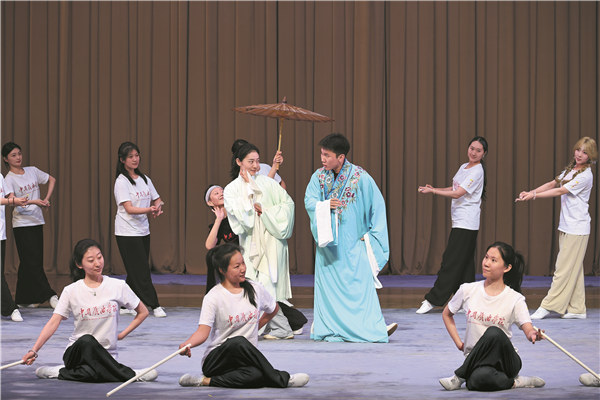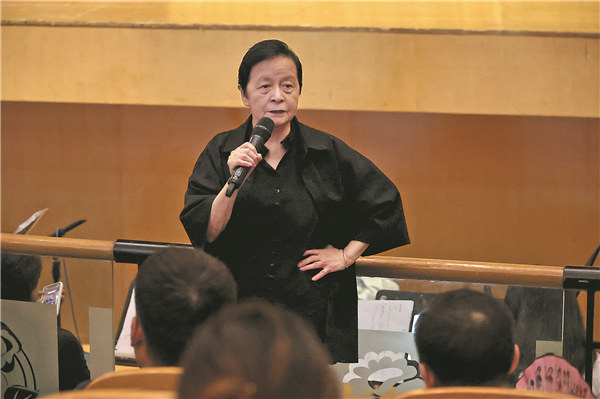Classic tale keeps core elements
From:China DailyAuthor: 2024-09-24 15:01

Young performers of the China National Peking Opera Company and students of the National Academy of Chinese Theatre Arts rehearse the Peking Opera The Legend of the White Snake, which will be staged at the National Centre for the Performing Arts in Beijing from Oct 1 to 3.[Photo provided to China Daily]
The first class Ye Shaolan had after he was admitted to study at the Experimental School of Chinese Theatre Arts (now the National Academy of Chinese Theatre Arts) in 1952 was learning the Peking Opera The Legend of the White Snake, which was written by famed playwright Tian Han (1898-1968) that year.
"Though more than 70 years have passed, I can still recall the moments when I learned the piece, which is so beautiful and romantic," recalls Ye, 82, at the National Centre for the Performing Arts in Beijing on Sept 11. "Unlike many other Peking Opera pieces, which mostly tell stories about history, politics, society and daily life, The Legend of the White Snake highlights love."
As one of the most famous folk tales from ancient China, The Legend of the White Snake is about a love affair between a female snake fairy named Bai Suzhen who transforms into a beautiful woman and a man called Xu Xian. They meet, fall in love and get married. But a monk, who considers Bai evil, jails her in a tower, getting in the way of the couple's happy life.
On Sept 11, the NCPA announced its new production of The Legend of the White Snake, which, inviting Ye to be the artistic consultant, will premiere with shows running from Oct 1 to 3.
Peking Opera is a 200-year-old art form that combines singing, dancing, acrobatics and martial arts. The old art form was inscribed in 2010 on the UNESCO Representative List of the Intangible Cultural Heritage of Humanity.
Ye has played the role of Xu many times, including his collaboration with Peking Opera actress Zhang Huoding taking the role of Bai in the production of The Legend of the White Snake in 2016. His father, Peking Opera master Ye Shenglan (1914-78), also performed the role of Xu in The Legend of the White Snake in Paris in 1955.
"The Legend of the White Snake marks a significant milestone in the development of Peking Opera. It's one of the most popular pieces among fans and has been performed by generations of artists," Ye Shaolan says.
According to Zhang Yao, vice-president of the NCPA, the new edition of the Peking Opera piece will be based on Tian's script and gather creative team members, including 82-year-old director Yang Xiaoqing and music director Yin Xiaodong. Veteran Peking Opera actresses Li Shengsu and Wang Yan will play the role of Bai and actor Li Hongtu will play the role of Xu.

Veteran Peking Opera artist Ye Shaolan (center) discusses moves of the Peking Opera piece, The Legend of the White Snake, with the creative team members of the new edition of the classic piece, at the NCPA, on Aug 27.[Photo provided to China Daily]
"Many classic scenes from The Legend of the White Snake are particularly famous and emblematic of the production's dramatic and emotional depth, such as the West Lake encounter, which sees Bai and Xu meeting for the first time and the confrontation with Fa Hai, featuring the conflict between Bai and the monk, who opposes the couple's reunion," says Zhang Yao. "These scenes are central to the opera's narrative and are notable for their dramatic presentation, emotional depth, and the use of traditional Peking Opera techniques, including elaborate costumes, symbolic gestures and stylized movements. Those classic scenes will be staged with the support of the latest multimedia technology, offering a visual feast for the audience, especially the young people."
Yin, the president of the National Academy of Chinese Theatre Arts, notes that besides the classic scenes, which highlight the love of the couple, the new production will also depict Bai's desire to become human, primarily due to her deep love for Xu.
"Bai falls in love with Xu and wishes to be with him as an equal. Her longing to become human also reflects a desire to experience the full spectrum of human life, including love, companionship and the joy of living in the human world," says Yin. "Her transformation is a central element to the story, symbolizing the theme of love transcending boundaries and the personal sacrifices made in the name of love."
For the music, Yin says that he will keep the original music from the 1952 version of The Legend of the White Snake, which was produced and performed by the National Academy of Chinese Theatre Arts.
"Tian Han served as the first president of the National Academy of Chinese Theatre Arts after the school was founded in 1950. After he finished writing the script of The Legend of the White Snake, artists of the school, including composer Wang Yaoqing, and director Li Zigui, who was the founder of the directing department of the school, worked together to bring the Peking Opera piece alive onstage," says Yin. "The Legend of the White Snake is a very important production for the school, passed down by generations of artists.

Director Yang Xiaoqing[Photo provided to China Daily]
"When Tian Han adapted the folk tale into a Peking Opera piece in 1952, his goal was to blend traditional elements with contemporary sensibilities to make the story more accessible and relevant to modern audiences. We are making the same effort to produce this new edition," adds Yin.
Director Yang, who is known for directing productions of traditional Chinese operas, such as Yueju Opera and Kunqu Opera, says that Tian Han's adaptation was part of a broader effort to revitalize traditional Chinese theater forms and make them more engaging for contemporary audiences, reflecting changes in Chinese society and artistic tastes.
Besides star Peking Opera artists, Yang also works with young performers from the National Academy of Chinese Theatre Arts and China National Peking Opera Company in this new version.
"Peking Opera features a highly stylized form of performance with specific vocal techniques, gestures and movements that can be difficult for those unfamiliar with the genre to grasp. It is deeply rooted in traditional Chinese culture and history, which may be unfamiliar to younger audiences who have not been exposed to these aspects in their education or daily life," says Yang. "Our young Peking Opera performers, who are similar in age to our young audience, inspire us to create."

Peking Opera actress Chu Fengyi, who plays the role of Bai Suzhen, at the rehearsal.[Photo provided to China Daily]
Edit:孙俪洋
The copyright of the article and the picture belongs to the original author. If there is any infringement, please contact to delete it